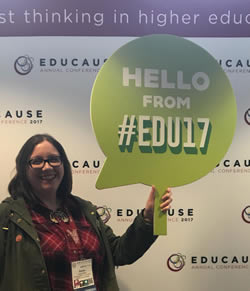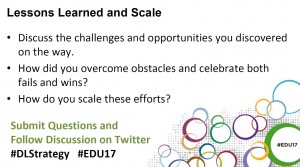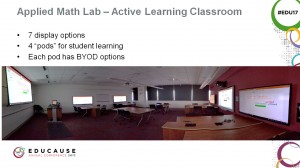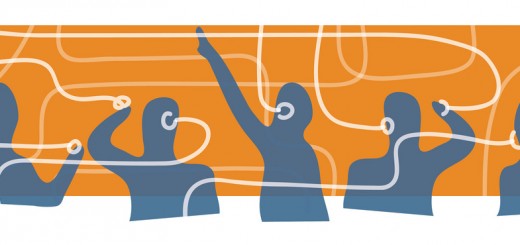EDUCAUSE Annual Conference #EDU17 Part 1
 I was lucky enough to attend the EDUCAUSE annual conference at the start of the month after applying for, and winning, a bursary from UCISA. This year the conference was held from 1st-3rd of November in Philadelpia, PA at the Philadelphia Convention Centre.
I was lucky enough to attend the EDUCAUSE annual conference at the start of the month after applying for, and winning, a bursary from UCISA. This year the conference was held from 1st-3rd of November in Philadelpia, PA at the Philadelphia Convention Centre.
I arrived in Philadelphia a few days before the conference, which gave me time to get used to the time difference as well as see some of the city itself (which I would definitely recommend visiting). It also gave me a chance to look at the conference program, which was made up of general sessions and parallel sessions, and decide which sessions to attend. The parallel sessions were categorised into ‘tracks’, which were:
- Driving Innovation in Teaching and Learning
- Enabling the Data-Driven, Decision-Making Environment
- Innovating in IT Infrastructure and Cloud-Based IT Environments
- Leading and Partnering Strategically across the Academy
- Producing, Distributing, and Using Digital-Based Knowledge
- Reducing and Managing Risk in a Digital World
- Transforming the Student Experience
I focused on sessions in the Driving Innovation in Teaching and Learning and Transforming the Student Experience tracks.
Over the three days the conference hashtag (#EDU17) was used to share thoughts, highlights, opinions and have discussions and is a great place to find out more.
Day 1
Wednesday started early with the general session “The Next 20 Years in Education and Technology” presented by Dr Michio Kaku, a futurist, theoretical physicist and author. In his session he gave predictions for the future (something which he admitted is difficult to do), much of it based around how he sees the increasing prevalence of the internet and how it is making it easier to access facts and information. He believes that the future of Higher Education will involve a shift in emphasis, away from memorisation towards a focus on teaching concepts and that the role of academics will become more of a mentoring one. No mention of whether we will have hoverboards or flying cars though. The next session I attended was a learning theatre session “Multiple Approaches for Designing and Implementing Innovative Learning Spaces” presented by Kelli Renee Jackson (Coppin State University), Joe Davis (Elon University), Daniel Harder (Emory University). Each of the presenters spoke about how they had introduced and used learning spaces in their institution.
Learning about learning spaces #EDU17 pic.twitter.com/LQjqVBE5aA — Emma Fletcher (@emmfletcher) 1 November 2017
At Coppin State they created the “Learning Commons”, an Applied Math Lab (Active Learning Classroom) and redesigned the Open Student Computer Lab. The “Learning Commons” were rooms that were available for student and faculty use that were located outside of classrooms and near faculty offices. They gathered feedback from students on the changes they made, which they see as an important part of the process. They found that staff who use traditional rows may need some support in changing the way they teach. At Elon University they made sure they involved all the “important” partners during the design stages, getting them to use paper cut outs of the furniture and think about how they wanted the space. This resulted in them removing some PCs, making space to write, and adding boards that can be taken off the wall to be written on. Emory University had the goal to “Build an interactive and welcoming learning space, for cutting edge research, application building, and data intensive projects”. They spoke about the importance of engaging the right people, echoing Elon Univerity, seeing it as a partnership (not us vs them) and strong communication throughout.
The first afternoon breakout session I attended was “A Look at How an LMS can Help Implement your UDL Strategies” presented by Kenneth Chapman (D2L) and Sandra Connelly (Rochester Institute of Technology). The Universal Design for Learning (UDL) post on our blog is ever popular so this was a session on using UDL strategies with Moodle was one I wanted to attend. UDL is a set of principles for curriculum development that give all individuals equal opportunities to learn. It differs from accessibility, which is often done afterwards. Using UDL means using multiple forms of representation and expression.
Implementing UDL in your LMS #EDU17 pic.twitter.com/1NE3zIYRdG
— Emma Fletcher (@emmfletcher) 1 November 2017
The presenters talked about how the Learning Management System (LMS), such as Moodle, can play a role in supporting the principles of UDL and gave some tips and tricks including:
- Chunk things small – 5 min activities
- Be consistent – naming, structure, voice, formats, placement, ordering
- Be clear – which readings are required? Why are you doing them?
- Assessments
- Ask yourself: Where are there barriers that don’t tie to your learning goal? (time, mouse, keyboard, etc)
- Design in ways to support alternative inputs, schedule, time limits
- Use rubrics to clarify expectations, provide examples.
- Involve your students
- ask them! What barriers are they seeing? What support and structure could be provided in a practical manner?
 The final session of the first day was “Insights for Advancing a Digital Learning Strategy in Higher Education” presented by Peter Bryant (LSE), Maya Georgieva (Digital Bodies) and Ben Maddox (New York University). They talked about the digital learning strategy as something to enable community building and, from their experiences, some of the lessons learnt.
The final session of the first day was “Insights for Advancing a Digital Learning Strategy in Higher Education” presented by Peter Bryant (LSE), Maya Georgieva (Digital Bodies) and Ben Maddox (New York University). They talked about the digital learning strategy as something to enable community building and, from their experiences, some of the lessons learnt.
I enjoyed the first day of the conference, there were some interesting sessions (and I had a chance to try the Microsoft HoloLens), keep an eye on the blog for the second post about the conference.
Emma



